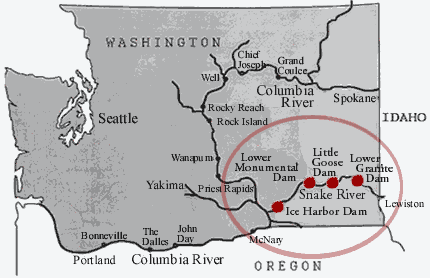forum
library
tutorial
contact

Judge's Statements Highlight Need for
New Direction in Salmon Policy
by Amy Baird
Blue Oregon, April 27, 2012
|
the film forum library tutorial contact |

|
Judge's Statements Highlight Need for
by Amy Baird
|
 Thirteen out of 19 salmon species on the Columbia-Snake Rivers are listed as threatened or endangered. The fight to save these critical fish has been waged in the courtroom for over a decade. Four - count 'em, FOUR - consecutive federal salmon plans (known as Biological Opinions) have been ruled illegal for not doing enough to protect salmon.
Thirteen out of 19 salmon species on the Columbia-Snake Rivers are listed as threatened or endangered. The fight to save these critical fish has been waged in the courtroom for over a decade. Four - count 'em, FOUR - consecutive federal salmon plans (known as Biological Opinions) have been ruled illegal for not doing enough to protect salmon.
The most recent plan was ruled illegal by Judge James Redden last August, when he described the plan as "arbitrary and capricious." After more than a decade of hearing testimony and pouring over the science and analysis surrounding salmon restoration, Judge Redden resigned from the case last fall.
Few people have more insight and knowledge of Columbia-Snake River salmon science and policy than Judge Redden, which is why his recent statements released by Earthfix media have caused such a stir. In a rare interview, Judge Redden stated his support for spilling more water at the dams to help migrating salmon reach the ocean. He also stated his support for removal of the four lower Snake River dams.
The federal agencies have resisted increasing spill (now in its 7th year thanks to Judge Redden's court order and the work of salmon advocates and fishermen), or even making it a guaranteed measure in the salmon plan, despite the overwhelming scientific evidence that spill helps save wild salmon. They've also resisted further analysis of removal of the four lower Snake River dams, despite the Judge ordering them to do so.
More than salmon are at stake in this debate, which in their own right are a delicious and nutritious food source, as well as a cultural icon and vital part of our ecosystem. As wild salmon populations continue to struggle, thousands of Northwest jobs across myriad industries are at stake. Literally billions of dollars supplement our region's economy as a result of healthy rivers and thriving fish runs.
What's needed now is a collaborative, science-driven process to fix our broken and illegal salmon policies. This process needs to involve more than just the federal agencies currently responsible: everyone with a stake in saving salmon deserves a seat at the table, including fishermen, tribes, irrigators, barge works, businesses, and others.
This kind of process has worked to restore rivers elsewhere - San Joaquin, Penobscot, Elwha - and it can work here too. And this kind of process would allow stakeholders to fully and openly discuss options like increasing spill or removing the lower Snake River dams. The Judge's last ruling provided a window of opportunity to set up this dialogue (giving the Federal Government until the end of 2013 to revise their illegal salmon plan).
The time is ripe for our elected leaders to convene a solutions table. With so much at stake, and with a chance to finally restore one of the Northwest's signature species, why wouldn't we try a new approach?
learn more on topics covered in the film
see the video
read the script
learn the songs
discussion forum
